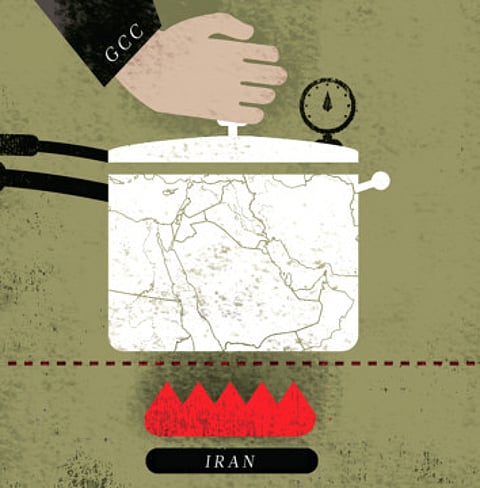Living in a dangerous neighborhood
The Middle East is in great peril, and that’s mainly because of Iran’s expansionist polices in the region

What the Gulf countries are facing collectively is not by any means simple or easy; it’s a complicated situation from a geopolitical point of view, one not experienced since the British withdrawal from the region in early 1970s. Even then, with all the crises, the scene was much clearer.
Two weeks ago, there was a summit — in Washington and later in Camp David — attended by two parties. The first party was the United States, represented by President Barack Obama, while the second party was the Gulf Cooperation Council (GCC), represented by six officials. These officials were either heads of state or crown princes or their equivalents.
This was the first time in recent history that the GCC faced another party as a collective unit, with the highest level of representation.
The issues discussed were not for individual states to tackle but issues that concerned all Gulf states and their future. Collective security is at stake here. The sources of threats are the same: Sunni and Shiite extremists. Both are playing havoc with security in the region — for instance, Daesh (the Islamic State of Iraq and the Levant) in the north and Al Houthis in the south.
The Middle East is in great danger, and that’s mainly because of Iran’s expansionist polices in the region, as manifested in Yemen, where the GCC states and their allies are at war. Planes are roaring and people are getting killed, and money is pouring to support this war.
No one can say whether this war will end soon. It is just like any other war: people know when it begins but have no clue when it can be ended.
Rapid expansion
The other war is against the dark face of terror, which can pop up anywhere, as successive suicide attacks against Shiite mosques in Saudi Arabia in the past two weeks have shown. Both were claimed by Daesh, which is rapidly expanding its presence in Syria and Iraq. These attacks happened as a result of widespread intolerance of a small number of people, who think that they have the entire truth, and thus the ‘divine right’ to kill others, simply because they don’t share their points of view. What the GCC is facing is the alliance of the religious right, so to speak. Although they (Sunni and Shiite right-wingers) oppose each, they have one common goal: to bring down GCC states.
The GCC countries face dual uncertainty, on one hand the vague and reluctant stand of its traditional allies, the United States and the West towards the threats, and the other from the regional foe Iran, which is driven in its expansionist policy not by reason but by what it perceives as its God-given mission. Statements by some leading Iranian officials refer to this ‘mission’ in unusual ways. Some say the Iranian revolution brought down the Soviet Union, while others maintain that developments in GCC states are solely driven by the heat generated by Iran’s revolution! Iran’s Supreme Leader Ayatollah Ali Khamenei was recently quoted as saying that “we have to face the new ignorance”, using the term which is used to describe the pre-Islamic era. These kind of words hardly facilitate negotiations, and are not in line with international norms regarding interstate relations.
One weapon has not been used so far to safeguard Gulf states from Iran’s expansionist policy — and is highly effective in my opinion: Showing unity of purpose. Iran wants to deal with these states individually. But if Gulf states deal with Tehran as a united bloc, then they can upset its plans. That is why Iranian propaganda is concentrating on Saudi Arabia and the UAE, leaving out other Gulf states, in order to drive a rift between GCC countries. Iran is doing it best to single out some of the Gulf states as aggressors but not all of them, so as to deal with them later or persuade them to break from others, with an implied threat that they (the Iranians) have some support from within in those countries. .
Four elements are key: First the geography; all Gulf states are linked by land borders with other Gulf states, and Saudi Arabia shares a border with each and every GCC state. Besides, all Gulf states share a common identity as Arabs and Muslims. In fact, some of the ruling families are related, and a number of tribes and families have ties of blood as well.
Second, they all facing a common threat to their security and wellbeing, and almost from the same source, either externally or internally, and they cannot face these threats individually. They should have a common policy when it comes to facing such threats.
Third, they share a common interest in the stability of their immediate region and beyond, and if they speak in one voice, they can have more influence.
Fourth they can, by uniting their goals and interest, bring on board other allies and friends, politically and strategically.
This weapon — unity — can help cement the security of GCC countries.
Mohammad AlRumaihi is a professor of political sociology at Kuwait University. You can follow him on Twitter at www.twitter.com/@rumaihi42



